On July 11, Los Angeles joined communities across North America to call for a halt to shipping volatile and toxic crude oil via unsafe rail cars, which has caused numerous derailment explosions during the last six years as the practice has increased 4,000%. In particular, activists called for the City of L.A. to protect their communities and $1.3 billion river revitalization by opposing a crude by rail expansion in San Luis Obispo. In September of 2015, the City passed a unanimous resolution to oppose the Phillips 66 expansion.
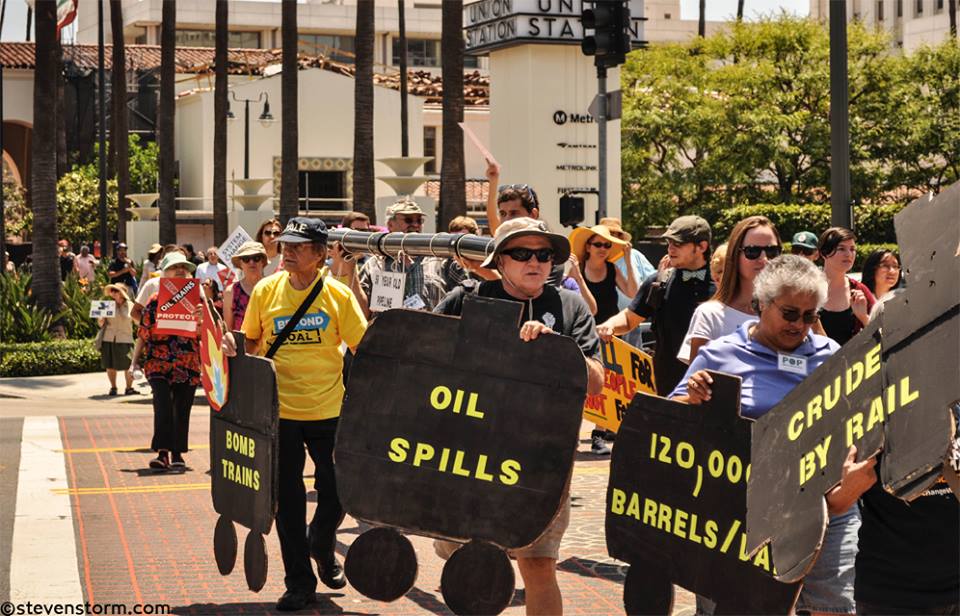

Rally and Teach-In at Union Station/Olvera Street Highlights Public Opposition to Dangerous Oil Trains
As Los Angeles endeavors to improve the quality of life for its citizens, making the city safer, more livable, with a more sustainable vision of our future and our Los Angeles River, danger rides the rails into our city.
LOS ANGELES, CALIFORNIA — On July 11 almost 200 people gathered at Union Station to learn about the danger of shipping volatile crude oil via rail and voice their opposition to these trains moving across California and through Los Angeles. The rally/teach-in was organized by Tar Sands Action SoCal and SoCal 350 Climate Action, and supported by almost thirty social justice, environmental, faith, community, indigenous peoples and labor organizations in Southern California as part of the Stop Oil Train Week of Action coordinated in dozens of cities across North America.
Oil trains from a proposed Phillips 66 offloading facility in San Luis Obispo County would bring into California nearly 3 million gallons of dangerous crude via rail, including volatile and toxic tar sands from Alberta, Canada. This is part of a 4,000% increase in oil trains in the last six years. Some of these 1 1/2-mile trains in unsafe rail cars will be rolling into Southern California, down tracks that cross the San Fernando Valley, following their L.A. River adjacent route through downtown on their way to and from Colton in the Inland Empire and the refineries in the L.A. Harbor Area.
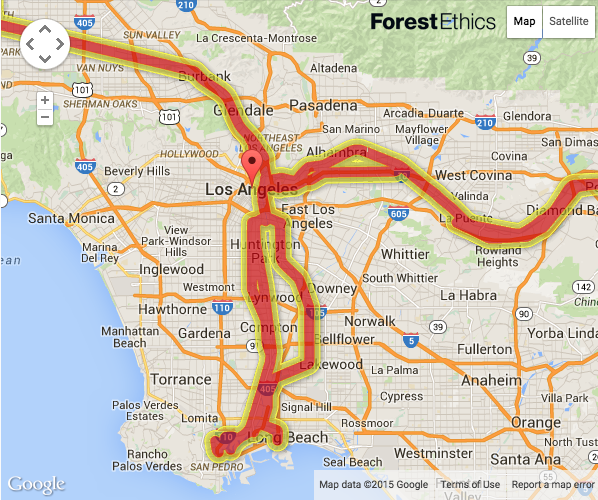

These trains have become known as “bomb trains” due to their explosive and destructive track record. Dorie Snow, a Registered Nurse with Keck Hospital of USC and California Nurses Association activist spoke during the teach-in. “Nurses are very concerned about the possibility of train derailment, explosion and fire which would have devastating health and safety impacts. We have grave concerns about the safety of children whose schools are in the blast zones around the oil train tracks. There are several hundred blast zone schools in California alone.”
Another speaker at the teach-in included Angela Mooney D’Arcy from the Sacred Places Institute for Indigenous Peoples, sharing the California indigenous perspective on preserving our sacred green infrastructure from disasters like what happened when a pipeline burst along the Santa Barbara Coast last May.
In 2005, just ten years ago, the number of train cars [in the U.S.] was about 2,000. Five years ago, it was about 30,000. And last year, there were more than 450,000 oil-filled rail cars on the train tracks of this country. — Sabina Virgo on KPFK
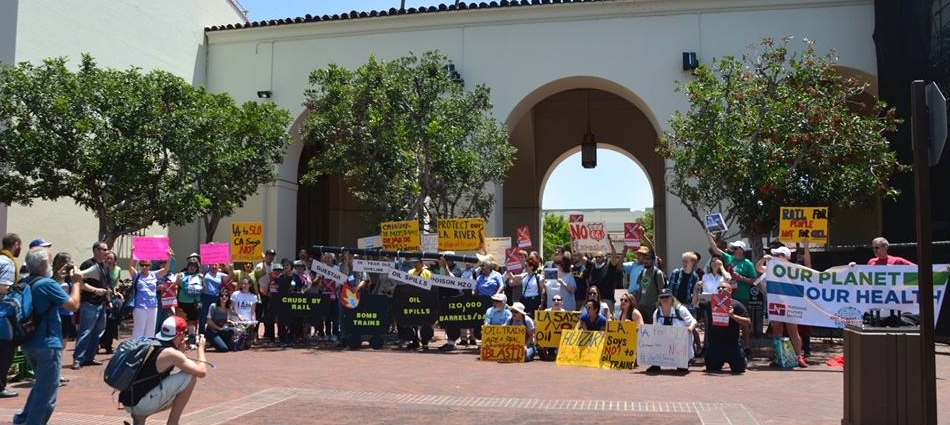

Alicia Rivera, an organizer from Communities for a Better Environment based in Wilmington, also spoke on a study recently completed by CBE and ForestEthics called “Crude Injustice on the Rails“: “Oil by rail disproportionately exposes communities of color that live in lower-income neighborhoods within a mile of the tracks to risks from accidents, explosions, air and water pollution. This is effectively environmental racism.” She called for an immediate moratorium on oil imports by train into California.
“This is a health and safety issue for the City of Los Angeles,” said Jack Eidt, an urban planner and environmental designer who co-founded Tar Sands Action SoCal, and publishes the environmental blog WilderUtopia. “What’s the use of spending $1 billion to revitalize our L.A. River when it could be despoiled with a fiery oil spill? The LA City Council must join over 30 city and county governments across California in signing a letter of opposition to the project. We would love to see Councilmember Huizar sponsor the measure already passed by the Mar Vista, Echo Park and Silver Lake Neighborhood Councils, because his district encompasses many neighborhoods that could be affected by a rail accident.”
Our emergency responders are simply not funded, trained or equipped to deal with a disaster of the magnitude threatened by this project. If there were an oil disaster in our community, we taxpayers would be stuck with the bill for firefighting, hazardous material cleanup and repair of infrastructure. The damage to our lives, our environment and our economy would be devastating. — Jan Marx, San Luis Obispo Mayor
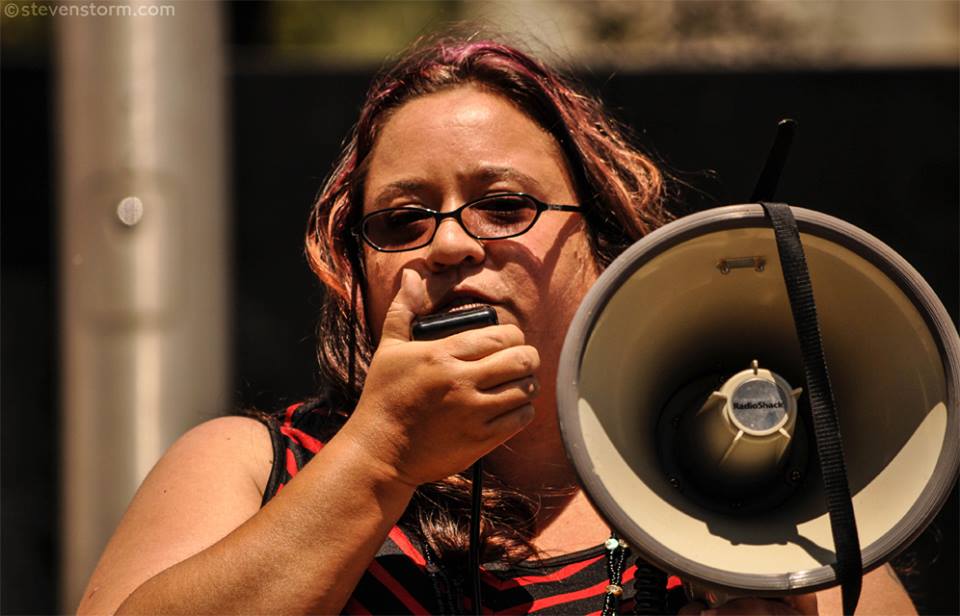

Much of the teach-in focused on turning Southern California into a model sustainable city. Jack Eidt argued that instead of major investments in infrastructure that will ship, store, process and export extreme fossil fuels like tar sands and fracked oil shale in a warming world where droughts, floods and wildfires have become the norm, we must find more efficient ways of getting around, heating and cooling and sustainably creating our consumer products. “We don’t need to put our water sources and communities at risk from bomb trains when we can invest further in public transit, more efficient cars that would run from solar power or advanced biofuels, heating and cooling using renewable energy sources, etc.”
[cincopa AUOAyzc4G4N7]

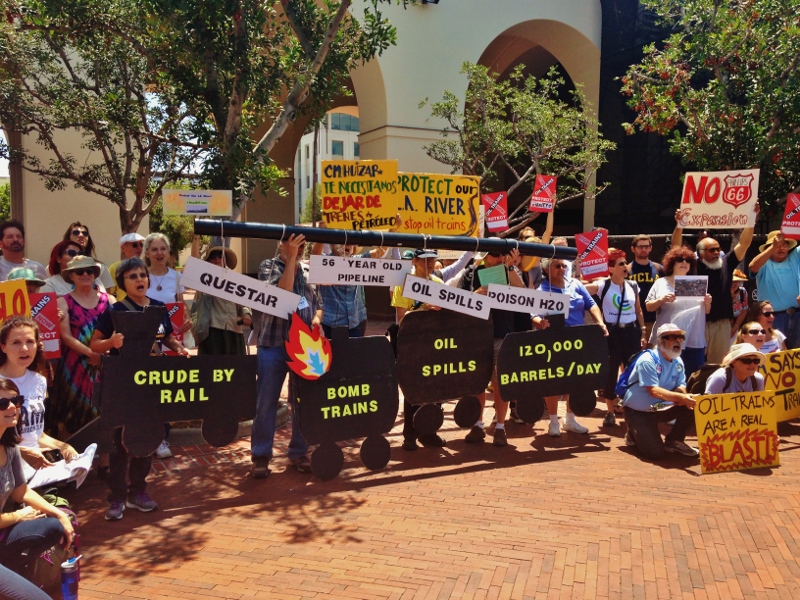








Pingback: LA River Must Transform as Watershed, Transport Corridor | WilderUtopia.com
Pingback: Stop Oil Trains in Los Angeles - July 11 | WilderUtopia.com
Pingback: Tar Sands Oil "Bomb" Trains Proposed for California | WilderUtopia.com